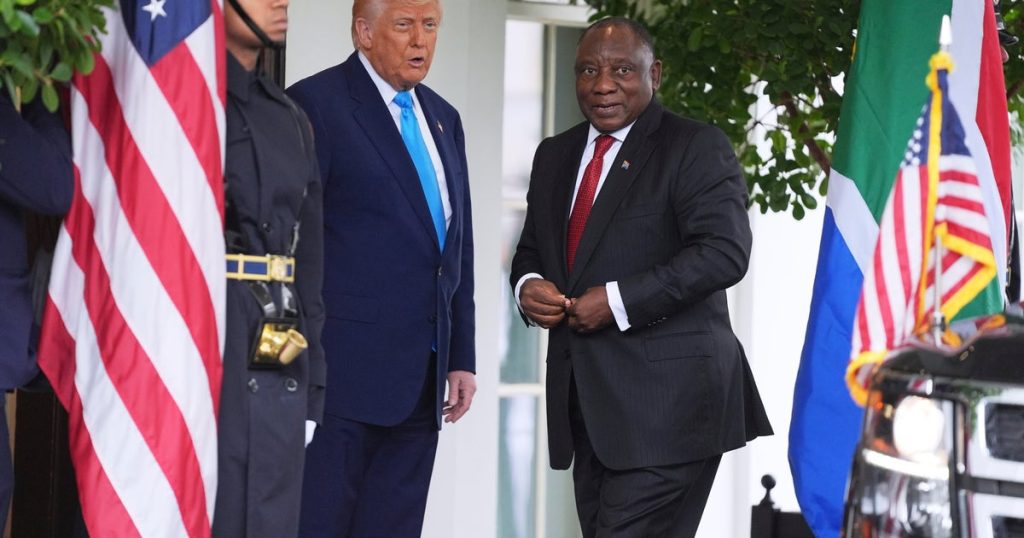A significant meeting took place at the White House on Wednesday between President Trump and South African President Cyril Ramaphosa, featuring South African-born billionaire Elon Musk. The meeting comes amid rising tensions over allegations of racial discrimination against White Afrikaners in South Africa. During the discussions, President Trump echoed claims of genocide against these individuals, a point of contention that has drawn sharp criticism from South African officials.
| Article Subheadings |
|---|
| 1) The Context of the Meeting |
| 2) South African Response to U.S. Claims |
| 3) The Impact of Recent Refugee Acceptances |
| 4) Congressional Concerns and Responsibilities |
| 5) The Future of U.S.-South Africa Relations |
The Context of the Meeting
On a chilly Wednesday morning, President Trump convened a meeting with President Cyril Ramaphosa at the White House. The meeting was intended to address complicated diplomatic relations between the United States and South Africa, with tensions exacerbated by President Trump’s repeated assertions that White Afrikaners in South Africa are facing genocide. The presence of billionaire Elon Musk, who has voiced support for this narrative, added an unusual dynamic to the discussions.
The meeting, which commenced at 11:30 a.m. ET, was structured to reevaluate the strategic partnership between the two nations. This initiative comes after a period marked by new tariffs imposed by the Trump administration, further straining U.S.-South African economic relations.
South African Response to U.S. Claims
The South African government has vigorously refuted allegations that White Afrikaners are facing systemic discrimination or genocide. Officials regard President Trump’s assertions as unfounded, stating that they only serve to heighten racial tensions and promote divisiveness. In fact, President Ramaphosa has referred to those seeking refuge in the U.S. as “cowards,” labeling their departure a betrayal of their homeland.
Furthermore, the South African administration cites the inclusion of an Afrikaner political party in the current governing coalition as evidence of their fairness and inclusivity in political representation. South African officials assert that these claims of persecution do not reflect the realities on the ground, finding support from various political entities within the nation who argue that collaboration is more vital than division.
The Impact of Recent Refugee Acceptances
Recently, the United States accepted 59 White Afrikaner refugees, a decision that has sparked heated debate. This action raises questions about the ongoing U.S. refugee admission policies, especially as the Trump administration aims to suspend the refugee program altogether. The expedited process for these specific individuals has prompted criticisms regarding racial bias towards their selection.
Critics, including Democratic Senator Tim Kaine of Virginia, have questioned the Trump administration’s decision-making, suggesting it prioritizes White Afrikaners based merely on their race. In a recent hearing, Kaine challenged Secretary of State Marco Rubio to explain why this group is receiving special treatment compared to other persecuted groups around the world, such as the Uyghurs in China or dissidents in Cuba. Rubio responded by downplaying the significance of the Afrikaners as a “small subset” of refugees.
Congressional Concerns and Responsibilities
The tensions surrounding this issue bubbled to the surface during a Congressional hearing where Senator Tim Kaine expressed his concern that the focus on Afrikaners might obscure the profound issues facing other minority groups worldwide. He challenged Secretary Rubio to provide justification for prioritizing this group and pointed out that the South African government has made strides in including Afrikaner representatives in its leadership.
Rubio acknowledged the emerging nature of this issue but also insisted on the administration’s right to address the concerns expressed by those fleeing South Africa. He noted, “It’s a new issue…and the president identified it as a problem.” This dialogue illustrates the complexities surrounding refugee policies and the often-contentious politics intertwined with them.
The Future of U.S.-South Africa Relations
As the meeting concluded, questions loomed over the future relations between the United States and South Africa. The challenges posed by differing perspectives on issues of race, discrimination, and human rights will continue to complicate diplomatic endeavors. The successful resolution of these diplomatic engagements is crucial, as both nations share significant interests in trade, investment, and managing mutual challenges like climate change.
Going forward, it is essential for both leaders to seek common ground, leveraging this unprecedented meeting to shift narratives away from confrontation. Observers will be monitoring the developments post-meeting to gauge whether a constructive dialogue can emerge from the tension-laden atmosphere.
| No. | Key Points |
|---|---|
| 1 | Meeting between U.S. and South African Presidents aimed at addressing diplomatic tensions. |
| 2 | Strong backlash from South African officials against claims of genocide. |
| 3 | 59 Afrikaners accepted as refugees raising concerns of bias in U.S. policies. |
| 4 | Congressional debate questioning the focus on White Afrikaners amidst other global crises. |
| 5 | The meeting highlights the complexities in U.S.-South Africa relations moving forward. |
Summary
In conclusion, the recent meeting between Presidents Trump and Ramaphosa underscores both nations’ efforts to redefine their relationship against a backdrop of rising tensions and conflicting narratives of discrimination. As discussions around race and migration policies continue to unfold, the challenges ahead will demand not only careful navigation but also mutual understanding to foster a more stable bilateral relationship.
Frequently Asked Questions
Question: What were the main topics discussed in the meeting?
The leaders discussed issues of racial discrimination, economic partnerships, and recent U.S. refugee admissions concerning White Afrikaners.
Question: How did South Africa respond to U.S. claims about Afrikaner persecution?
South African officials denied the allegations, calling them unfounded and accusing the U.S. of exacerbating racial divisions.
Question: What are the implications of recent U.S. refugee acceptances?
The acceptance of 59 Afrikaner refugees has led to criticisms regarding racial bias in U.S. immigration policies and raised questions about prioritizing certain groups over others.


